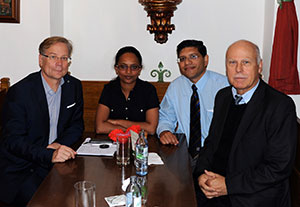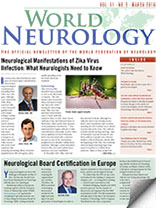
Pictured, left to right: Professor Reinhold Schmidt, president of the Austrian Society of Neurology; Dr. Hanna Demissie Belay, assistant professor, department of neurology at Addis Ababa University, Ethiopa; Dr. Kalpesh Jivan (South Africa) and Professor Wolfgang Grisold, WFN secretary general.
First, I have the deepest appreciation and gratitude to the World Federation of Neurology and Austrian Neurological Society for endorsing the African Initiative and introducing and supporting the department visit program. I would like to thank Professor Wolfgang Grisold and Professor Eduard Auff for their kind welcome and for hosting me at the Medical University of Vienna in October 2015. I wish to express my sincere thanks to Professor Fritz Zimprich, who was my mentor and made my stay incredibly productive and interesting. I would also like to thank Tanjia Weinhart for effectively arranging my stay from the very beginning up to the end. I thank profusely all the hospital staff of AKH Wien for their kind help and cooperation throughout my stay.
I started my visit in the department of neurology with an introduction and warm welcome from all the staff and the head of the department. I started my training on the neurology ward, where, initially, I was overwhelmed by the size and complexity of the hospital. The department of neurology, alone, occupied two floors for inpatient services and another floor for outpatient services.
I spent my first week in inpatient services on the neuromuscular ward and later in the neurorehabilation unit. I was able to follow acute management of neuromuscular disorders and rare cases, including anti-NMDA receptor encephalitis, which I saw for the first time. I spent a day with the occupational therapists, speech therapists, physiotherapists and other members of the team. I was impressed to see how intense and well coordinated the rehabilitation process was. It further strengthened my conviction that rehabilitation is of utmost importance in the management of many neurological patients. During this time, I was introduced to techniques that I may also apply at my home department. I have decided to try establishing a neurorehabilitation unit in one of the hospitals affiliated with our university. Since my visit, I joined Addis Ababa University in Ethiopia as a faculty member. If successful, it will be the first of its kind in the country.
Among the highlights of my stay was the third week in which I spent in the epilepsy monitoring unit. I observed invasive electrode implantation, and I was lucky enough to attend awake epilepsy surgery. Witnessing something you have had only the chance to read about before was amazing. During the rest of the time, I attended the epilepsy clinic and followed a number of complex epilepsy cases.
I spent half days of week three on the electrophysiology units (NCS, EMG, EP and ultrasound). I was impressed to see how useful ultrasound examination could be in the evaluation of many neurological diseases. I plan to collaborate with our colleagues in the department of radiology to eventually establish a similar service at my home institution. I spent a few days with the neuro-interventionalist, where I observed certain procedures not practiced within our department.
I spent time at different specialty clinics and learned much from everyone involved. By week four, I attended different specialty clinics, such as the neuromuscular unit, as well as the multiple sclerosis, epilepsy, headache, vertigo and Parkinson’s disease clinics. Each unit was a stimulating experience. At the vertigo clinic, for the first time, I could see electronystagmography being performed on a patient. During a night shift, I learned how to evaluate and confirm brain death.
I was invited to give a talk on the practice of neurology in Ethiopia. I got to talk about my country, the burden of neurological disease in our setting, how neurology is being practiced, which neurological disorders are common and how we manage them. The audience was attentive, and the post-talk discussion was very lively. It allowed me to share my experiences and describe working conditions on “the other side of the world.”
I also had the privilege to visit another hospital, Kaiser Franz Josef Spital and attend a tumor board session, guided by Professor Wolfgang Grisold. I found it to be interesting, and it can easily be adapted to a set up like ours.
My stay in Vienna was not only formally educational, but it also gave me the opportunity to meet neurologists from Austria and share experiences.
My weekends were always full, and Vienna fascinated me with its timeless beauty, culture and artistic attractions. It felt like heaven to walk in the park of Schönbrunn during a windy day in October. I was impressed with the antiquely furnished imperial apartment, the Sissi Museum and the silver collection of the Hofburg Palace. I was also speechless to see all the paintings by pioneering expressionists, such as Klimt, Schiele and Kokoschka at the beautiful palace of the Belvedere. I attended an Edvard Munch exhibition hosted by the Albertina Museum. It was also in Vienna that I attended my first opera.
During this visit, I witnessed that neurology or neuroscience is a fast-growing field, and each of us from different parts of the world can contribute a lot. I had only slight difficulties with the language barrier, and even then someone was always beside me to help. People were kind enough to try their best to communicate in English. Even though the duration of the stay seemed short, it is enough to meet the goal of the observership program. However, I believe the program to be so important that I suggest the number of young neurologists sponsored should be increased.
As a recommendation, I think the WFN can also think about exchange programs, whereby neurologists from developed countries pay a visit to African institutes and we can share our experiences. It is my hope that this program will continue and flourish in the future. It is encouraging and inspiring to young neurologists. It will also open a door for future collaborations and joint research projects.
In general, I can say with confidence that this program is successfully fulfilling its goal of fostering global neurological education.
